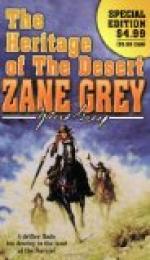August Naab placed a sympathetic hand on Hare’s shaking shoulder.
“You see, lad, things are never so bad as they seem at first. Snap might as well try to catch a bird as Silvermane.”
XVIII THE HERITAGE OF THE DESERT
“Mescal’s far out in front by this time. Depend on it, Hare,” went on Naab. “That trick was the cunning Indian of her. She’ll ride Silvermane into White Sage to-morrow night. Then she’ll hide from Snap. The Bishop will take care of her. She’ll be safe for the present in White Sage. Now we must bury these men. To-morrow—my son. Then—”
“What then?” Hare straightened up.
Unutterable pain darkened the flame in the Mormon’s gaze. For an instant his face worked spasmodically, only to stiffen into a stony mask. It was the old conflict once more, the never-ending war between flesh and spirit. And now the flesh had prevailed.
“The time has come!” said George Naab.
“Yes,” replied his father, harshly.
A great calm settled over Hare; his blood ceased to race, his mind to riot; in August Naab’s momentous word he knew the old man had found himself. At last he had learned the lesson of the desert—to strike first and hard.
“Zeke, hitch up a team,” said August Naab. “No—wait a moment. Here comes Piute. Let’s hear what he has to say.”
Piute appeared on the zigzag cliff-trail, driving a burro at dangerous speed.
“He’s sighted Silvermane and the rustlers,” suggested George, as the shepherd approached.
Naab translated the excited Indian’s mingling of Navajo and Piute languages to mean just what George had said. “Snap ahead of riders— Silvermane far, far ahead of Snap—running fast—damn!”
“Mescal’s pushing him hard to make the sand-strip,” said George.
“Piute—three fires to-night—Lookout Point!” This order meant the execution of August Naab’s hurry-signal for the Navajos, and after he had given it, he waved the Indian toward the cliff, and lapsed into a silence which no one dared to break.
Naab consigned the bodies of the rustlers to the famous cemetery under the red wall. He laid Dene in grave thirty-one. It was the grave that the outlaw had promised as the last resting-place of Dene’s spy. Chance and Culver he buried together. It was noteworthy that no Mormon rites were conferred on Culver, once a Mormon in good standing, nor were any prayers spoken over the open graves.
What did August Naab intend to do? That was the question in Hare’s mind as he left the house. It was a silent day, warm as summer, though the sun was overcast with gray clouds; the birds were quiet in the trees; there was no bray of burro or clarion-call of peacock, even the hum of the river had fallen into silence. Hare wandered over the farm and down the red lane, brooding over the issue. Naab’s few words had been full of meaning; the cold gloom so foreign to his nature, had been even more impressive. His had been the revolt of the meek. The gentle, the loving, the administering, the spiritual uses of his life had failed.




